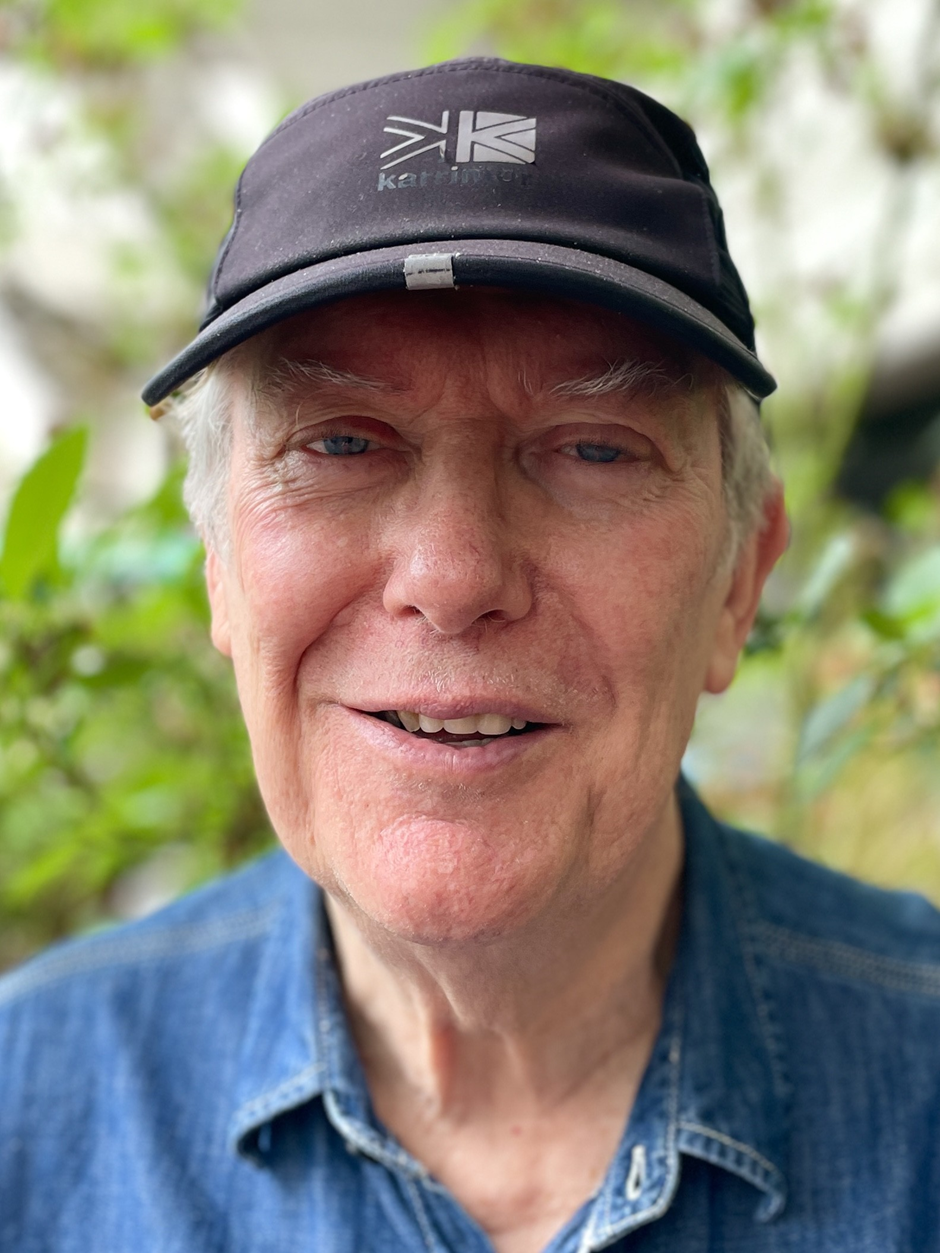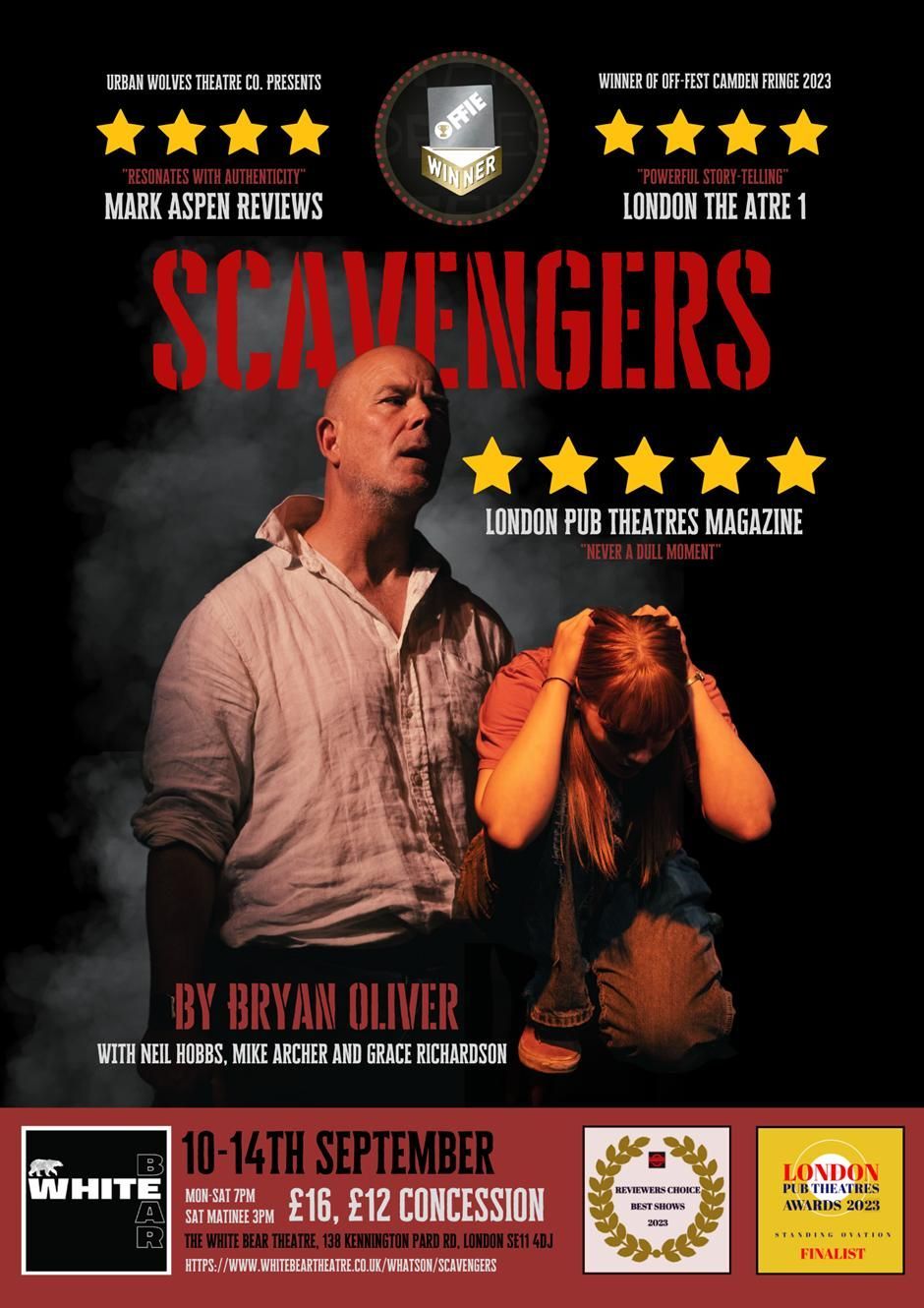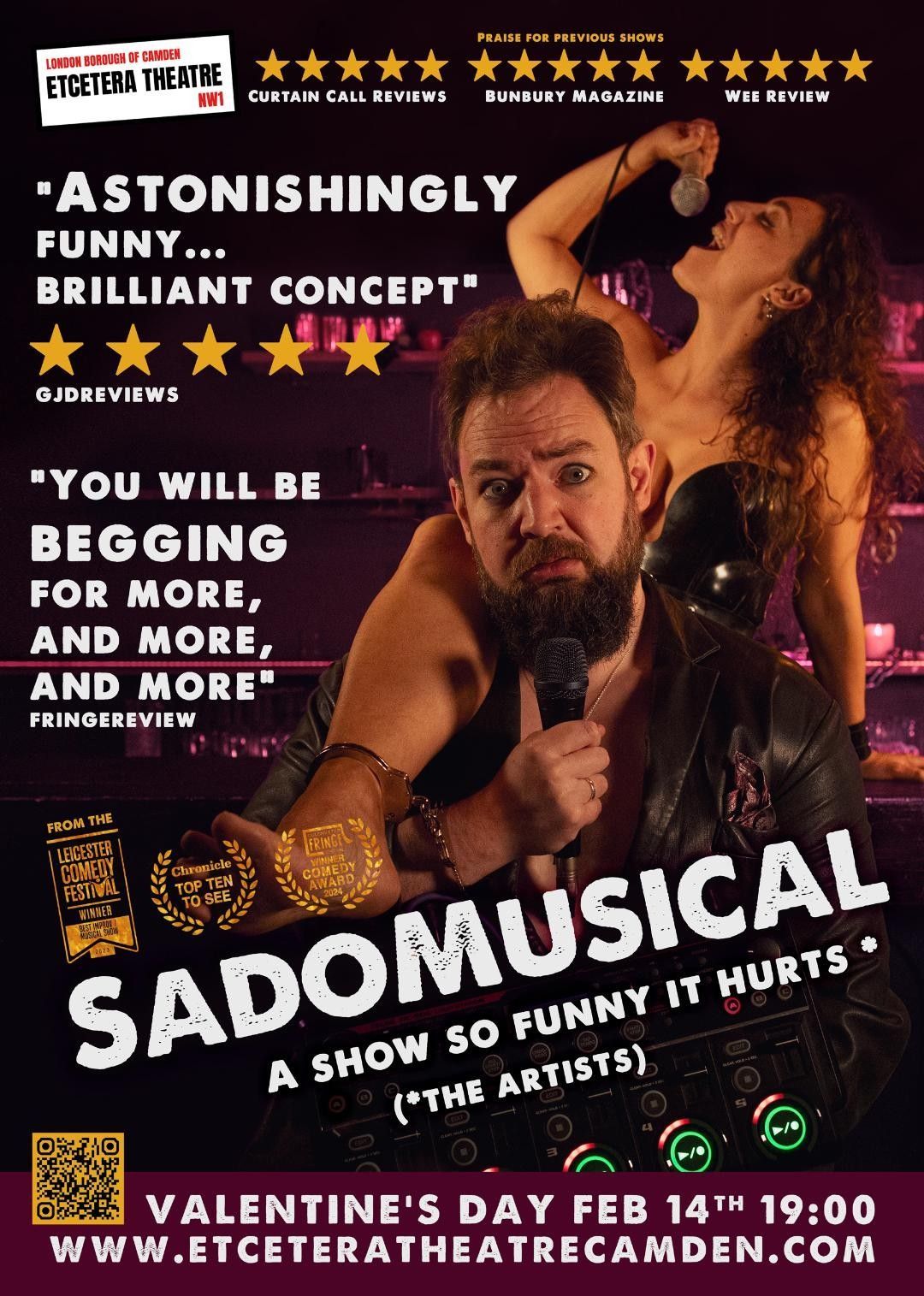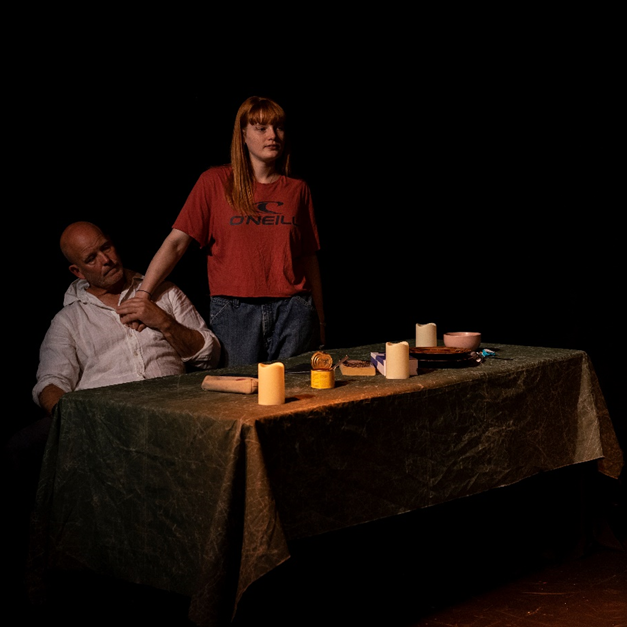Bryan Oliver (Urban Wolves Theatre) is writer, director and actor having worked in Repertory Theatres, Touring Companies, and at the Tron and Edinburgh Festivals. His dystopian play Scavengers premiered in 2023 and won the OffFest Camden Fringe Award 2023. It was also a Finalist for a Standing Ovation Award and London Pub Theatres Magazine Reviewers Choice of best shows 2023.

Heather Jeffery: Thrilled to have this opportunity to ask you about your work especially having seen the premiere of Scavengers last year. Dystopian drama is very much my bag. Is it the kind of writing that you particularly enjoy?
Bryan Oliver: Yes, I’m very much interested in contemporary themes that explore future possibilities in a dystopian way. There is an alleged Chinese curse, which I’m sure you’ve heard, that says, “may you live in interesting times.” Dystopian drama in interesting times allows an audience to live out, through the characters and events, their own fears, hopes and dreams, while posing perhaps the unanswerable questions: What would we do in similar circumstances? How would we survive? What lengths are we prepared to go to survive? Etc. However, I think all dystopian stories are ultimately hopeful because at the end of the drama, we walk out of the theatre. We’re still breathing. We’re still alive. We still have ambitions and dreams. The world is still turning. There is still hope for the future.
I found a relevant quote from Margaret Atwood (The Blind Assassin): “All stories are about wolves. All worth repeating, that is. Anything else is sentimental drivel …” and I wondered whether this is something that resonates with you and your play Scavengers.
That’s a great quote. Yes, it does resonate with me and my play Scavengers to a certain degree. I do have a fascination with Wolves. Both human and animal. They both get bad press, but are intriguing, fascinating and exciting. Not that I’d want to meet one of them down a dark alley, but we can meet human wolves and be excited and fearful of them in the safety of the theatre. I’ve even named my theatre company after them!
It seems that you have many hats (for Scavengers), as writer, director, lighting and sound designer. I still remember the sound of the elevator gears shifting ominously heralding terror for the scavengers living below ground. I’m fascinated when the sound appears to come from a particular place in the room. How is this achieved?
Well, firstly, it’s about searching and sifting through and finding the right sound effects for what’s indicated in the play. This all takes time. Then it’s down to good speakers and a good sound and lighting operator. We are very happy to have Rebecca Lyon back on board with us.
The drama premiered at Etcetera Theatre and is now transferring to White Bear, in Kennington. They each have very specific (and very different) qualities, is this an important factor for you?
They are both very intimate spaces, which I think works well for the world of Scavengers. The audience are right in there with the actors and the action of the play. I remember one of the actors, when they first saw how close the audience were going to be at the Etcetera Theatre, saying, “Well, we can’t get away with anything here!” However, I think Scavengers would work in a larger space too.
Image below: Neil Hobbs and Grace Richardson in Scavengers (Etcetera Theatre 2023). They will be reprising their roles as Wikki and Zeb, joined by new cast member, Mike Archer, as Fin
As an actor yourself, and having trained in both Meisner and Stanislavski, how is this reflected in your direction of Scavengers?
I enjoy working with actors who are trained in Meisner and/or Stanislavsky as we then approach the play and characters from similar directions. However, I’ve worked with many actors who have differing techniques. I then adjust my direction to fit in with the actor’s needs, capabilities and style of acting. Some actors are very instinctive, which is also a great asset to have. It’s about being in the moment from moment to moment. Not always an easy thing to do. For Scavengers it’s important for me to have actors who want to delve deeply into their characters and events in the play. As Meisner said, “Acting is behaving truthfully under imaginary circumstances.” It takes a certain courage. The ability to leap emotionally into the unknown. Neil, Mike and Grace are all willing to take that leap.
The cast that I saw last year were perfect in their roles. Have you got the same team this year? What will be different?
Neil Hobbs and Grace Richardson will be reprising their roles as Wikki and Zeb with Mike Archer as the new Fin. Mike was in my play Experiment 150 at The White Bear Theatre pre covid and he also trained in Meisner with me. It’s exciting to have new energy coming into the play. It keeps us all on our toes.
Your work in theatre has been very extensive. I’m interested to know how you developed as a writer and whether this was on the job, or through specific courses. What would you consider the best possible way to learn the craft?
I started writing when I was just a kid. I’d write my own short stories and badly drawn comics. I remember my mother telling me that when I was 5 years old, I said to her: “Mum, when I grow up, I’m going to be an actor.” When I was about ten, I remember telling a relative the same thing and she laughed in my face. Coming from a working-class background, I understand her response, but it wasn’t very helpful at the time, so I didn’t mention my ambition to be an actor or writer again. However, I did do some acting in school productions. So, even at an early age, I was juggling between writing and acting. I wrote my first play “Game” at drama school. It was a two hander and eventually went on at The Arts Theatre as a lunchtime show. Looking back, it was a rather derivative piece, but it was a start. I then went on to have some plays produced by the BBC and RTE in Ireland. I never went on any writing courses, but I think being an actor helped me as a writer to create characters, dialogue, situations and plots. I think there are many ways for a writer to develop their craft. I’ve done many readings and workshops and been a member of a couple of writing groups here in London, but the main thing is to keep on writing. It can be a very lonely thing to do. But I keep going. Following the childhood dream.
In fact, you’ve written, directed and produced many plays on the London Fringe and had productions at many theatres. (The Arts Theatre, The White Bear, Old Red Lion, Finborough Arms, The Gate, Battersea Arts, Croydon Warehouse, The Tabard, etc.) What are the pros and cons of producing work today against producing work a decade ago?
Everything is so much more expensive! When I first started out you could often get a Church hall to rehearse in for free. That’s all changed. Also being at a Fringe venue can be very expensive these days. It’s great that Michael Kingsbury at The White Bear will often agree on box-office splits and offer rehearsal space. When I first started out, nearly everyone on the fringe was doing box office splits. A rarity now.
So pleased that we will have a second chance to see Scavengers as so much good work just disappears and only lives in the memory. How do feel about that, and would you like your work to be recorded for posterity?
I love to see old film/videos of people in bygone times walking through streets and laughing and being human. It’s a snapshot of time. There they are, living and breathing and I wonder what they did the moment the film ends, what their lives were like. The same with old photographs. I’m fascinated by them. There are the people captured in a moment of time and then they are gone. It’s the same with plays. There they are. We experience them. Moments in time, then they disappear. I remember reading in an article somewhere that many critics of Shakespeare’s time thought that he was a hack writer. So that for me poses the question: What were all those other plays that they considered to be so amazing? The plays were never published. We will never know, never be able to compare or experience them. Lost treasures. Gone forever. It would be great for Scavengers and my other work to be saved for posterity, but if not, I’m in excellent company.
Of course, Scavengers is very much of its time and could be seen as a warning of what might happen if humanity doesn’t manage to resolve environmental issues. Do plays ever change anything? If not, what is their importance to society?
I think the Arts enrich us all as human beings. Without plays, films, literature, opera, dance, paintings, etc, what kind of world would we be living in? With all the horrors that surround us from day to day, plays, and the arts in general, serve humanity in many ways. They can be a well-deserved distraction, and, sadly, in some countries an indoctrination, but they can also be a signpost towards something else. A different way or more humane way of looking at things, of living our lives. I think plays can be inspirational and influential and mentally and emotionally challenging. I have personally been influenced by actors and playwrights to the point of becoming an actor and a playwright. Plays have certainly changed my life!
Finally, what are you most looking forward to sharing with audiences?
Spaghetti! (if your readers come to the show, they’ll see what I mean).
However, I’m mostly looking forward to sharing the committed and exciting work of the actors and the emotional journey of the play.
Hope to see you all there.
SCAVENGERS by Bryan Oliver
Presented by Urban Wolves Theatre Company at White Bear Theatre
10th - 14th September 2024
In a post- apocalyptic world, three scavengers battle against overwhelming odds to try and survive. Set in the basement of a London Tower block after a major ecological disaster, Wikki and Zeb are lovers hiding away from the Warlord's hunters. Wikki is much older than Zeb and when Finn, another survivor, breaks in looking for food and water, all their lives are thrown into danger and confusion. They are forced to confront sexual longings, fears, and deadly outside forces that threaten to destroy everything they believe and desperately cling on to.










